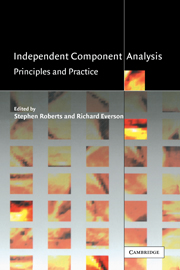Book contents
- Frontmatter
- Contents
- Preface
- Contributors
- 1 Introduction
- 2 Fast ICA by a fixed-point algorithm that maximizes non-Gaussianity
- 3 ICA, graphical models and variational methods
- 4 Nonlinear ICA
- 5 Separation of non-stationary natural signals
- 6 Separation of non-stationary sources: algorithms and performance
- 7 Blind source separation by sparse decomposition in a signal dictionary
- 8 Ensemble Learning for blind source separation
- 9 Image processing methods using ICA mixture models
- 10 Latent class and trait models for data classification and visualisation
- 11 Particle filters for non-stationary ICA
- 12 ICA: model order selection and dynamic source models
- References
- Index
11 - Particle filters for non-stationary ICA
Published online by Cambridge University Press: 05 July 2014
- Frontmatter
- Contents
- Preface
- Contributors
- 1 Introduction
- 2 Fast ICA by a fixed-point algorithm that maximizes non-Gaussianity
- 3 ICA, graphical models and variational methods
- 4 Nonlinear ICA
- 5 Separation of non-stationary natural signals
- 6 Separation of non-stationary sources: algorithms and performance
- 7 Blind source separation by sparse decomposition in a signal dictionary
- 8 Ensemble Learning for blind source separation
- 9 Image processing methods using ICA mixture models
- 10 Latent class and trait models for data classification and visualisation
- 11 Particle filters for non-stationary ICA
- 12 ICA: model order selection and dynamic source models
- References
- Index
Summary
Introduction
One may think of blind source separation as the problem of identifying speakers (sources) in a room given only recordings from a number of microphones, each of which records a linear mixture of the sources, whose statistical characteristics are unknown.
Here we consider the blind source separation problem when the mixing of the sources is non-stationary. Pursuing the speakers in a room analogy, we address the problem of identifying the speakers when they (or equivalently, the microphones) are moving. The problem is cast in terms of a hidden state (the mixing proportions of the sources) which we track using particle filter methods, which permit the tracking of arbitrary state densities. Murata et al. [I9971 have addressed this problem by adapting the learning rate and we mention work by Penny et al. [2000] on hidden Markov models for ICA which allows for abrupt changes in the mixing matrix with stationary periods in between.
We first briefly re-review classical Independent Component Analysis. ICA with non-stationary mixing is described in terms of a hidden state model and methods for estimating the sources and the mixing are described. Particle filter techniques are then introduced for the modelling of state densities. Finally, we address the non-stationary mixing problem when the sources are independent, but possess temporal correlations.
- Type
- Chapter
- Information
- Independent Component AnalysisPrinciples and Practice, pp. 280 - 298Publisher: Cambridge University PressPrint publication year: 2001
- 4
- Cited by



